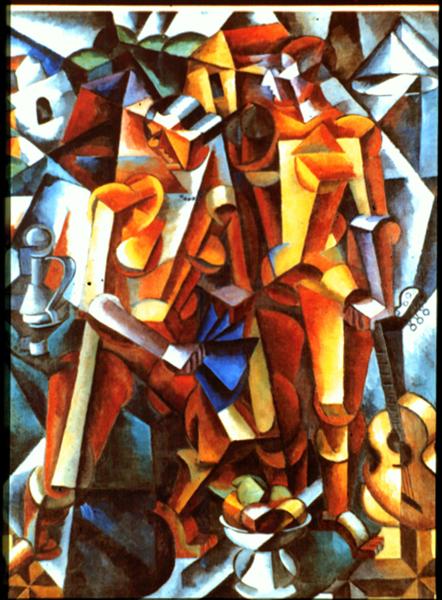Description
The painting "Figures - 1913" by Henri Le Fauconnier is a work that brilliantly embodies the ideals of the artistic avant -garde of the beginning of the twentieth century, specifically within the framework of Fauvism and Cubism, styles with which the author associated and that in their work they present a delicate fusion of shapes and an innovative exploration of color. In this piece, Le Fauconnier uses a masterful approach to the composition, where the fragmentation of the figures is embodied through a geometrization that defies the conventions of the traditional representation of the human body.
The work is dominated by a vibrant use of color, which is not only limited to the naturalistic representation of skin tones, but expands towards a bold and expressive palette. This chromatic choice generates a sense of movement and vitality, multiplying the possible readings of the painting. Earth tones are combined with luminous accents, creating a visual tension that invites contemplation. Each figure seems to dialogue both with its environment and the others, suggesting a dynamic interrelation that resonates with the exploration of the space that characterizes the works of this era.
In "Figures - 1913", the characters represent a variety of postures and attitudes, which underlines human and emotional diversity. Although the figures are not exterior in their traditional form, the cubistization that the artist applies reveals a deep reflection on the identity and essence of the human being. The decomposition of the silhouettes suggests a criticism of the unilateral vision of reality, inviting the viewer to perceive the complexity of existence from multiple angles.
When observing the work, one can notice how composition itself plays a crucial role. Le Fauconnier places the figures in a space that, although it seems flat, feels dense and loaded with meaning. The diagonal lines and intersections that emerge from the fragmentation confer to the work an almost architectural structure that directs the look through the pictorial surface, transiting from one figure to another in a fluid way.
The use of color and shape in this work by Le Fauconnier reflects the influence of their contemporaries, such as Pablo Picasso and Georges Braque, who explored the deconstruction of the human figure in geometric shapes. However, each artist brings his own voice to this idea, and Le Fauconnier, with "Figures - 1913", testifies to the search for a new visual reality that claims both emotion and reason in art. This dialogue with the past in the modern context is a fundamental aspect that makes this work a key piece to understand the transitions of painting in the twentieth century.
Through "figures - 1913", Henri Le Fauconnier not only manages Its complexity. The work remains, as a vibrant and evocative representation of a crucial moment in art history, a milestone that continues to resonate for future generations of artists and art lovers equally.
KUADROS ©, a famous paint on your wall.
Hand-made oil painting reproductions, with the quality of professional artists and the distinctive seal of KUADROS ©.
Art reproduction service with satisfaction guarantee. If you are not completely satisfied with the replica of your painting, we refund your money 100%.

